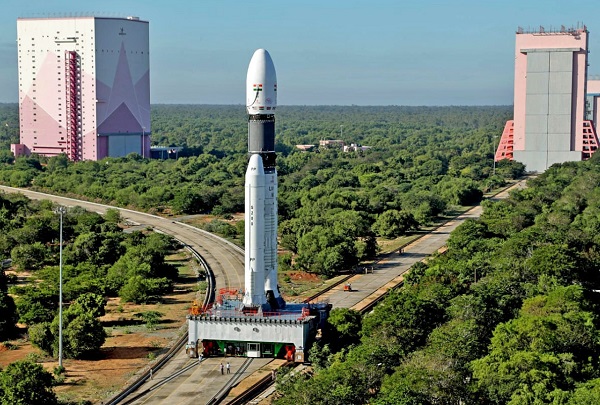
Chennai, (Asian independent) The Indian space agency on Saturday at 12.07 a.m. began the 24-hour countdown for the launch of its heavy lift rocket GSLV Mk III – renamed for this mission as LVM3 M2 – carrying 36 ‘OneWeb’ satellites.
The 43.5 metre tall and weighing 644 ton LVM3 M2 rocket is scheduled to blast off from the first second pad at India’s rocket port in Sriharikota in Andhra Pradesh at 12.07 a.m. on Sunday.
“The countdown is in progress smoothly. The gas charging and propellant filling operations of L110 stage are progressing,” an Indian Space Research Organisation (ISRO) official told IANS.
During the countdown, the rocket and satellite systems will be checked. The fuel for the rocket will also be filled.
Normally the GSLV rocket is used for launching India’s geostationary communication satellites. And hence it was named as GeoSynchronous Satellite Launch Vehicle (GSLV). The GSLV MkIII refers to the third generation rocket.
As the rocket that will fly on Sunday morning will be orbiting the OneWeb satellites in Low Earth Orbit (LEO), the ISRO has renamed GSLV MkIII as LVM3 (Launch Vehicle MkIII).
The rocket, just over 19 minutes into its flight, will sling the 36 small broadband communication satellites of Network Access Associated Ltd (OneWeb) in LEO.
OneWeb, is a joint venture between India Bharti Global and the UK government.
The satellite company plans to have a constellation of about 650 satellites in low earth orbit (LEO) to offer communication services.
The LVM3 M2 is a three stage rocket with the first stage fired with liquid fuel, the two strap on motors powered by solid fuel, the second by liquid fuel and the third is the cryogenic engine.
The ISRO’s heavy lift rocket has a carrying capacity of 10 ton to the LEO and four ton to the Geo Transfer Orbit (GTO).
“The total launch mass of OneWeb satellites will be 5,796 kg,” said ISRO.
The 36 satellites will be on a dispenser system made by the Swiss based Beyond Gravity, formerly RUAG Space.
The Beyond Gravity had earlier provided the satellite dispensers for launching 428 OneWeb satellites to Arianespace.
“The dispenser with 36 satellites was supplied by the vendor. It was used in all their earlier launches,” the official told IANS.
For Beyond Gravity, this is the first time their dispenser is fitted in an Indian rocket.
Starting in 1999, ISRO has put into orbit 345 foreign satellites till date.
The successful launch of 36 OneWeb satellites will take the tally to 381.
Another set of 36 satellites from OneWeb is planned to be put into orbit in January 2023.
This launch brings OneWeb’s constellation to 462 satellites, more than 70 per cent of the satellites required for OneWeb to reach global coverage.
According to ISRO, the OneWeb Constellation operates in a LEO Polar Orbit.
The satellites are arranged in 12 rings (Orbital planes) with 49 satellites in each plane. The orbital planes are inclined to be near polar (87.9 Degree) and at 1,200 km above the Earth.
Each satellite completes a full trip around the earth every 109 minutes.
The earth is rotating underneath satellites, so they will always be flying over new locations on the ground. The constellation will have 648 satellites.
NewSpace India Ltd (NSIL), the commercial arm of ISRO, has signed two contracts with Network Access Associated Ltd (OneWeb) for launching the latter’s broadband communication satellites in low earth orbit.
The board of OneWeb had voted to suspend satellite launches from the Baikonur rocket port in Russia.
Meanwhile, the Sunday rocket mission has several firsts for the Indian space sector. It is the first commercial launch of GSLV MkIII and for the first time an Indian rocket will be ferrying a payload of about six tonnes. Similarly, the OneWeb is using an Indian rocket to put its satellites into orbit for the first time. Also, it is the first commercial launch of GSLV MkIII contracted by NSIL, and for the first time a renamed GSLV MkIII is being used for launching satellites in LEO.







